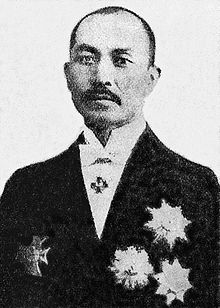- Mo Teh-hui
-
Mo Teh-hui
莫德惠 (莫柳忱)
Civil Governor of Fengtian In office
April 7, 1926 – October 3, 1927Succeeded by (none) Personal details Born 1883
Xinjiang, ChinaDied April 17, 1968 (aged 87)
Taipei, TaiwanNationality Chinese Political party Kuomintang This is a Chinese name; the family name is Mo (莫).Mo Teh-hui (Chinese: 莫德惠; pinyin: Mò Déhùi; Wade–Giles: Mo Teh-hui; 1883, Xinjiang province, China – April 17, 1968, Taipei, Taiwan) was a nationalist Chinese politician.
Contents
Biography
Mo was born on the ninth year of Guangxu (光緒九年, 癸亥, 1883) in Xinjiang (新疆), of Machurian father and Uighur mother.[1] Mo's political career started in 1921, in Binjiang County (near Harbin) of Manchuria. As the magistrate of that county, Mo divided the county into five defense districts coterminous with the regular police districts, and recruited men into the constabulary to defend the whole county against bandits.[2] He held that post until 1912, when he was elected to the provisional National Assembly of the newly established Republic of China.
He was Acting Minister of Agriculture and Commerce (1925) and Minister of Agriculture and Industry (1927-28) of China and, in the interim, served as the Civil Governor of Fengtian (Liaoning) (1926-27). In the Huanggutun Incident of 1928, he was on the same train with Marshall Zhang Zuolin and fortunately escaped with only a leg injury.
Following the reorganization of the Chinese Eastern Railway in 1929 and after the conclusion of the Sino-Russian complications, Mo was appointed president of the Board of Directors ("duban") of the railway. He was later appointed as the official representative of the Mukden (Shenyang) and Nanking Government for the purpose of negotiating a settlement of outstanding problems pertaining to the administration of the C.E.R. He was appointed plenipotentiary delegate to the Sino-Russian Conference at Moscow in May 1930. Mo visited USSR for up to 25 talks, but returned to China in December 1930 due to a dealock of the Conference. After Japan's Invasion of Manchuria on September 18, 1931, the USSR sold its interests in C.E.R. to Japan's puppet state Manchukuo.[3]
In 1938, Mo became a nonpartisan member of the People's Political Council (國民參政會) at Chungking, the National Government's wartime seat, and was named chairman of the council's presidium in 1942. After the War, he served as a nonpartisan delegate to the Political Consultative Conference (政治協商會議). He was also a delegate to the National Assembly when it reconvened later in 1946, and was elected vice chairman of the commission for the supervision of the enforcement of constitutional government, becoming its chairman in September 1948. He served on the State Council (國民政府委員會) in 1947-48, and ran for the Vice Presidency of the Republic of China in 1948. He was appointed as the president of the Examination Yuan, after the Kuomintang retreated from the mainland to the island of Taiwan (1954-66).[4]
See also
- Warlord era
- Central Plains War
- Mukden Incident
- Xi'an incident
- Zhang Zuolin
- Chiang Kai-shek
- Madame Chiang Kai-shek
- History of the Republic of China
- National Revolutionary Army
- Whampoa Military Academy
- Second Sino-Japanese War
- Military of the Republic of China
- Politics of the Republic of China
- Sino-German cooperation (1911–1941)
- Kuomintang
- Chinese Nationalism
Published
- [民國莫柳忱先生德惠自訂年譜]
References
- ^ [民國莫柳忱先生德惠自訂年譜]
- ^ http://www.encyclopedia.com/doc/1G1-152922866.html, Ma Fang, HRZ, (v.5, 1994), 56.
- ^ http://www.republicanchina.org/campaign.html, Written by Ah Xiang , RepublicanChina.org
- ^ http://rulers.org/indexm5.html-rulers.org
External links
- rulers.org
- Ministries 1912-28
- http://www.republicanchina.org/campaign.html-republican china
- http://www.historycooperative.org/journals/jsh/40.1/shan.html-Insecurity, Outlawry and Social Order: Banditry in China'S Heilongjiang Frontier Region, 1900–1931
- http://www.encyclopedia.com/doc/1G1-152922866.html-HigBeam Encyclopedia
- http://www.worldstatesmen.org/China_prov.html-Provinces and Administrative Divisions of China
- http://lib-ap-svr.exam.gov.tw/ccdb2/Result_List.
- http://beijingspring.com/big5bjs/bjs/bc/150/68.txt
- 張學良為何拒絕恢復自由
Preceded by
Chia Ching-hehPresident of the Examination Yuan
September 1954—August, 1966Succeeded by
Sun FoPolitical parties in the Republic of China Pan-Blue Coalition 
Pan-Green Coalition Minor Warlord era in early Republic of China (1916–1930) Main events (1916–1920) Main events (1920–1930) Northern Factions Southern Factions Empire of China (1915–1916)
National Protection War (1915–1916)
Death of Yuan Shikai (1916)
Manchu Restoration (1917)
Constitutional Protection Movement (1917–1922)
Siberian Intervention (1918–1920)
Paris Peace Conference (1919)
May Fourth Movement (1919)
Occupation of Mongolia (1919–1921)Zhili–Anhui War (1920)
Guangdong–Guangxi War (1920–1921)
First Zhili–Fengtian War (1922)
Second Zhili–Fengtian War (1924)
Beijing coup (1924)
Yunnan–Guangxi War (1925)
May 30 Movement (1925)
Anti–Fengtian War (1925–1926)
Northern Expedition (1926–1928)
Huánggūtun Incident (1928)
Flag Replacement of the Northeast (1928)
Central Plains War (1930)Chinese Civil War Main events pre-1945 Main events post-1945 Specific articles - Sino-Soviet conflict (1929)
- Encirclement Campaigns (1930–1934)
- Chinese Soviet Republic (1931–1934)
- Long March (1934–1936)
- Xi'an Incident (1936)
- Second United Front (1937–1946)
Part of the Cold War
- Full-scale Civil War (1946–1949)
- Kuomintang Islamic Insurgency in China (1950–1958)
- Campaign at the China–Burma Border (1960-1961)
- First Taiwan Strait Crisis (1955)
- Second Taiwan Strait Crisis (1958)
- Third Taiwan Strait Crisis (1996)
- Pan-Blue visits to mainland China (2005-)
- Political status of Taiwan
- Legal status of Taiwan
- Chinese reunification
- Taiwan independence
- Cross-Strait relations
Primary participants
Politics of the Republic of China (Taiwan) Doctrines 
Government BranchesExecutive (Premier) · Legislative (Speaker) · Judicial · Control · Examination · Defunct: National AssemblyLeadershipParties OthersElections PresidentialLegislativeNational AssemblyCross-Strait Foreign affairs United Nations · Chinese Taipei · India · Japan · Paraguay · Singapore · South Korea · United States · VenezuelaOther topics StatusPolitical · LegalIssuesCategories:- 1881 births
- 1968 deaths
- Kuomintang politicians in Taiwan
- Republic of China politicians from Xinjiang
- Taiwanese Presidents of the Examination Yuan
- Senior Advisors to President Chiang Kai-shek
Wikimedia Foundation. 2010.
